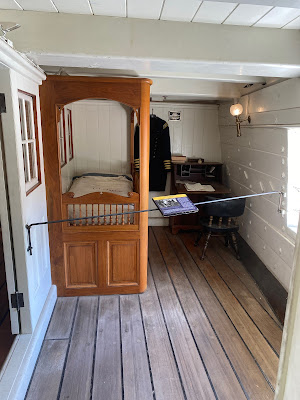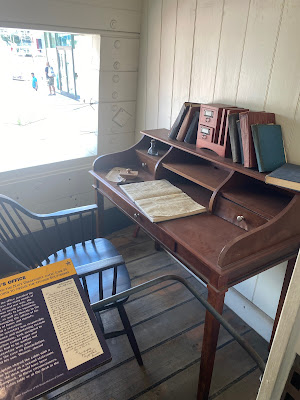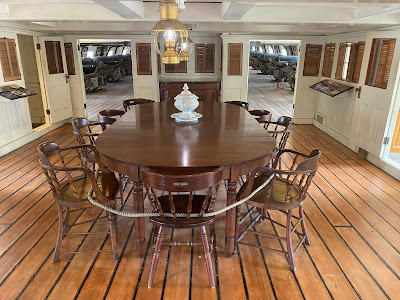The following was originally posted in August 2019, pre-pandemic, after returning from our last trip to the US. I maintain some hope of getting there this year, but it's fading. Yes, it was a hard trip, but I had no idea it would be the last for two years, and I wish we had taken more time. The meaning of the title quote continues to deepen.
 |
Gabriel Joseph de Froment, Baron de Castille, and his wife,
Princess Hermine Aline Dorothée de Rohan,
with their family. French School, 1825. |
I’ve long loved travel. It’s a passion my parents sort of had to force on me, but once it took hold, I was hooked. Journeys, even short ones, have a remarkable ability to change your perceptions, even of those things most familiar and dear. I had a startling reminder of this while traveling with my family in the US for two weeks. Though we took the baby to visit family when he was four months old, I consider this our first proper overseas excursion with two children, and oh my! What a marathon we ran! It was a lot of work, but I was prepared for it, and I think we weathered it pretty well. I returned home ready to process the memories, and as always I looked to Austen for guidance. What a shock to discover that this holiday suddenly allowed me to relate to Lady Middleton! My interpretation of Austen has again undergone a metamorphosis, driven by the new set of experiences and impressions brought on by travel with kids.
Take the title quote as an example. In the oh so recent past, I celebrated it for its snark, usually invoking it after saying goodbye to houseguests. Suddenly, it imparts a coziness before unknown. In Indiana, we had two nights at the house of my in-laws, a four bedroom which slept close to twenty people over the course of our stay. Now that was a party! Then in Texas, on the banks of Lake LBJ, my aunt and uncle’s four bedroom housed over ten for two nights. It was wonderful being with so many cousins and loved ones, but covering five states in fifteen days kept each reunion short and succinct. Normally, I might have lamented this brevity, but with the two kids it was just right. My daughter wasn’t around anyone long enough to become too provocative, and the toddler (he’s a good little monkey, but very curious) didn’t have long enough to figure out how to cause any true chaos. He did attempt to abscond with all my aunt’s remote controls, but I thankfully checked the bag he stashed them in before departing.
When I now read the quote, which references a visit by Isabella and John Knightley to Hartfield, I can barely trace the sarcasm I once found in it. Yes, our travels were perfect in being much too short. We left pleased with everyone and them with us. Just another day or two to linger might have soiled my happy recollections. It was incredibly hard to say goodbye, too soon and for too long, over and over again, but boy, did we feel the love! How fortunate we are to have such a wonderful and diverse family! I’m so grateful my children got to know them all better. Living so far away makes the time together so much more precious.
On every formal visit a child ought to be of the party, by way of provision for discourse. In the present case it took up ten minutes to determine whether the boy were most like his father or mother, and in what particular he resembled either, for of course every body differed, and every body was astonished at the opinion of the others. – Sense and Sensibility, Chapter Six
Another favorite quote that is suddenly imbued with new resonance. I’ve felt its truth for a long time, as my daughter has for eight years provided living proof, but my little guy is much more sociable and engaging than she was, content to sit sit and immerse herself in a project. Jack likes to be in the middle of everything. It is actually rather a strain on conversations, as they are hard to maintain, but he certainly keeps things from ever getting dull.
Unfortunately, a baby can’t be charming all the time, and I was honestly too tired to protest whenever someone volunteered to chase after him for me, a scenario which allows me to empathize with Lady Middleton’s hitherto intolerable laxity.
She saw with maternal complacency all the impertinent encroachments and mischievous tricks to which her cousins submitted. She saw their sashes untied, their hair pulled about their ears, their work-bags searched, and their knives and scissors stolen away, and felt no doubt of its being a reciprocal enjoyment. It suggested no other surprise than that Elinor and Marianne should sit so composedly by, without claiming a share in what was passing.
“John is in such spirits today!” said she, on his taking Miss Steeles’s pocket handkerchief, and throwing it out of window–“He is full of monkey tricks.”
And soon afterwards, on the second boy’s violently pinching one of the same lady’s fingers, she fondly observed, “How playful William is!”
“And here is my sweet little Annamaria,” she added, tenderly caressing a little girl of three years old, who had not made a noise for the last two minutes; “And she is always so gentle and quiet–Never was there such a quiet little thing!”
But unfortunately in bestowing these embraces, a pin in her ladyship’s head dress slightly scratching the child’s neck, produced from this pattern of gentleness such violent screams, as could hardly be outdone by any creature professedly noisy. – Sense and Sensibility, Chapter Twenty-One
Almost without exception, repeatedly over the course of the trip, anytime I asserted something about one fo the kids, their behavior instantly contradicted me. What can you do but laugh? It’s an inescapable part of motherhood. And let’s be honest: sometimes mom is just too tired to get up and stop the tormenting child. It doesn’t make it right, but it’s true. My apologies to anyone who was screamed at, bitten, or hit during the course of our travels. Poor Lady Middleton! What a relief it must be to her to have the Misses Steeles to stay and distract the children. I’m actually feeling a bit salty with Austen here, as she is quite hard on Lady Middleton, who really isn’t a bad sort. Wow! There’s a revolution for my mind.
The journey would have been totally intolerable if not for the help of my husband. I don’t know how my mom managed me on her own, a thought which led me to reevaluate my opinion of Anne Elliot and Captain Wentworth’s relationship. Persuasion has long been my favorite Austen novel, but my feelings towards Wentworth are subject to rather massive revision about once a decade (Anne I shall ever hold in the utmost and unwavering esteem). When I first read the novel, my heart was all Wentworth’s. In more recent years, I’ve found him rather petty and immature, though his letter always wins my forgiveness in the end. I still think he’s awfully childish in his behavior towards Anne upon their first reacquaintance, but the years have taught me that some men, like my husband, will always retain a certain immaturity (really wouldn’t have him any other way, though it’s challenging at times), and that the best relationships involve give and take, and a perception of the other’s needs to make that work. This is what the captain so perfectly displays when he and Anne are thrust together one morning at Uppercross Cottage. It is a scenario that I have lived innumerable times over the past few weeks.
Another minute brought another addition. The younger boy, a remarkable stout, forward child, of two years old, having got the door opened for him by some one without, made his determined appearance among them, and went straight to the sofa to see what was going on, and put in his claim to anything good that might be giving away.
There being nothing to eat, he could only have some play; and as his aunt would not let him tease his sick brother, he began to fasten himself upon her, as she knelt, in such a way that, busy as she was about Charles, she could not shake him off. She spoke to him, ordered, entreated, and insisted in vain. Once she did contrive to push him away, but the boy had the greater pleasure in getting upon her back again directly.
“Walter,” said she, “get down this moment. You are extremely troublesome. I am very angry with you.”
“Walter,” cried Charles Hayter, “why do you not do as you are bid? Do not you hear your aunt speak? Come to me, Walter, come to cousin Charles.”
But not a bit did Walter stir.
In another moment, however, she found herself in the state of being released from him; some one was taking him from her, though he had bent down her head so much, that his little sturdy hands were unfastened from around her neck, and he was resolutely borne away, before she knew that Captain Wentworth had done it. – Persuasion, Chapter Nine
He might be angry and hurt, but Wentworth must act, must do what he can to help, when he sees that Anne requires it. My husband has a similar, easy way of stepping in just when I need him to, usually while others sit nearby and admonish the problem child from afar, a la Charles Hayter. I think it is in this moment that the captain first proves his ongoing worthiness of Anne’s affections. I hope I let my husband know how much those moments mean to me.
 |
Tinted line drawing by C.E. Brock,
courtesy of Mollands.net.
|
On the other side of the coin, there were moments during our travels when my husband stood there and stared at me when I most required assistance, usually after Jack fell and hurt himself (this happened at least three times a day). In one particularly striking incident, the baby fell down a flight of steps, luckily coming to a halt on a landing instead of making the rest of his way down to the bottemmom. I was there in an instant, scooping him up, and turned to see both my mother and husband staring at me in shock. What would I not give to have had an Anne Elliot on the scene? Fortunately, he was largely unscathed, but as the near disaster swarmed around me, my mind managed to drift away to Lime Regis:
“Is there no one to help me?” were the first words which burst from Captain Wentworth, in a tone of despair, and as if all his own strength were gone.
“Go to him, go to him,” cried Anne, “for heaven’s sake go to him. I can support her myself. Leave me, and go to him. Rub her hands, rub her temples; here are salts; take them, take them.” – Persuasion, Chapter Twelve
I always wanted to be more like Anne, but not to the extent of being the only deer that knows how to run from the headlights. That was quite frustrating. However, it was Captain Wentworth’s cry for help that first leapt into my mind, allowing me to relate to his predicament a great deal more than I have in recent years. “Are you all just going to stand there and stare at me?” I cried. “Someone get ice!” I guess I should just count my blessings that there is a pseudo-Anne on hand, and that we’re not both befuddled in an emergency. This goes back to the give and take. We all have our strengths to bring to the team. I bet Anne and Wentowrth made a great one.
So travel, as always, has expanded my mind, and consequently my understanding of my favorite writer. This process will continue throughout my life, and who knows where it will lead me? How has your perception of Austen changed with the years?


























